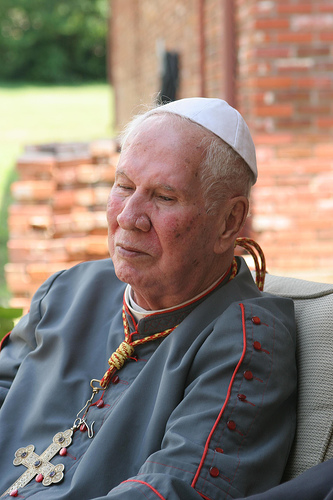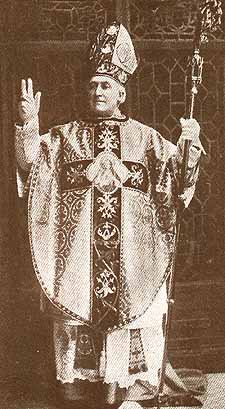|
Worldwide Communion Of Catholic Apostolic Churches
The Worldwide Communion of Catholic Apostolic Churches (WCCAC; es, Comunión de Iglesias Católicas Apostólicas Mundiales, CICAM) was a communion of independent Catholic churches connected to the Brazilian Catholic Apostolic Church (ICAB). The Worldwide Communion of Catholic Apostolic Churches was founded around 2008 in Guatemala. In spite of its ambitious aims, there is no independent evidence of any recent activity of this organization, which seems to have stalled. Jarvis, Edward. ''God, Land & Freedom, the true story of ICAB,'' Apocryphile Press, Berkeley CA, 2018, pp 164-165 Organization and beliefs The Worldwide Communion of Catholic Apostolic Churches adhered to a conventional Catholic Christian faith, though with openness to other beliefs that they perceive do not contradict the Catholic faith. Similarly, the WCCAC understanding of church structure and hierarchy, sacraments, and holy orders essentially did not differ from conventional Catholicism, but dissolution of marri ... [...More Info...] [...Related Items...] OR: [Wikipedia] [Google] [Baidu] |
Western Christianity
Western Christianity is one of two sub-divisions of Christianity ( Eastern Christianity being the other). Western Christianity is composed of the Latin Church and Western Protestantism, together with their offshoots such as the Old Catholic Church, Independent Catholicism and Restorationism. The large majority of the world's 2.3 billion Christians are Western Christians (about 2 billion – 1.2 billion Latin Catholic and 800 million Protestant). The original and still major component, the Latin Church, developed under the bishop of Rome. Out of the Latin Church emerged a wide variety of independent Protestant denominations, including Lutheranism and Anglicanism, starting from the Protestant Reformation in the 16th century, as did Independent Catholicism in the 19th century. Thus, the term "Western Christianity" does not describe a single communion or religious denomination, but is applied to distinguish all these denominations collectively from Easte ... [...More Info...] [...Related Items...] OR: [Wikipedia] [Google] [Baidu] |
Edward Jarvis (author)
Edward Jarvis FRAS FRHistS (born 1975) is a British author of religious history, politics and theology, and an Anglican clergyman. His books address previously underresearched topics, namely the Independent Sacramental Movement and the introduction of Christianity in Southeast Asia, specifically Vietnam, Myanmar (Burma), and Malaysia. Early life and education Edward Jarvis was born in Kingston upon Hull, England, in 1975, to an English father and an Italian mother. His great-grandfather was the Italian film actor Umberto Sclanizza. He is a first cousin (five times removed) of travel writer, novelist, and biblical translator George Borrow and a distant cousin of Colonel Sir Weston Jarvis, an MP and Chair of the Royal Empire Society. Jarvis attended the Malet Lambert School before studying theology and religious studies at Trinity & All Saints College, York St John, and the Logos Institute of Theology. Work Jarvis authored the first ever biographies of Brazilian bishop Car ... [...More Info...] [...Related Items...] OR: [Wikipedia] [Google] [Baidu] |
Venezuelan Catholic Apostolic Church
The Venezuelan Catholic Apostolic Church (ICAV - ''Iglesia Católica Apostólica Venezolana'') was a short-lived politically inspired independent Catholic church in Venezuela. It was revived in the twenty-first century after a hiatus of over fifty years and is currently led by Guillermo Pacheco Bornacelli, who serves as Apostolic Administrator of the Apostolic Vicariate of San Juan Bautista. The church was initially created in 1947 by Luis Fernando Castillo Mendez and three church members. Castillo Mendez had previously been expelled from Roman Catholic seminary after only one term and jailed for impersonating a priest. He was never recognized as a Roman Catholic priest. The new church adopted pearl-gray clerical dress in contrast to the Catholic Church's black, made Spanish the liturgical language instead of Latin, and permitted its clergy to marry; this resulted in formal excommunications of the highest degree."Venezuelan Schism Hit: Archbishop Declares Excommunication of 4 Prie ... [...More Info...] [...Related Items...] OR: [Wikipedia] [Google] [Baidu] |
Mexican Catholic Apostolic Church
The Mexican Catholic Apostolic Church ( es, Iglesia Católica Apostólica Mexicana (ICAM)) is an Independent Catholic denomination founded in 1925, by separating from the Catholic Church. It was created to bolster revolution with the support of the Regional Confederation of Mexican Workers (CROM) and Mexican President Plutarco Elías Calles' approval. Its development was marked by several internal crises, followed by consequent splits and mergers. Since 1993, it has been officially listed in the Mexican Federal Registry of Religious Associations. Name The church is identified in Spanish as both ' (Spanish for Mexican Orthodox Apostolic Catholic Church) and ' (Spanish for Mexican Catholic Apostolic Church); in English it also known as the Old Mexican Roman Catholic Church, and the Mexican National Catholic Church. History President Álvaro Obregón and his successor Calles, as well as other politicians, wanted the revolutionary government to restrict and terminate the Catholic C ... [...More Info...] [...Related Items...] OR: [Wikipedia] [Google] [Baidu] |
Argentine Catholic Apostolic Church
, abbreviation = ICAA , image = , imagewidth = , caption = , main_classification = Western Christian , orientation =Independent Catholic , polity = Episcopal , founder = Leonardo Morizio Domínguez , founded_date = 1971 , founded_place = Buenos Aires, Argentina , separated_from = , branched_from = Brazilian Catholic Apostolic Church , leader_title = , leader_name = Dante Luis Bergonzi Moreno , merger = , separations = , associations = Worldwide Communion of Catholic Apostolic Churches , area = Argentina , congregations = , members = , footnotes = The Argentine Catholic Apostolic Church ( es, Iglesia Católica Apostólica Argentina, ICAA), also known as the Argentine National Church, is an Independent Catholic Christian church derived from the Brazilian Catholic Apostolic Church (ICAB). The was founded in 1971 in Buenos Aires by Leonardo Morizio Dominguez, with a clear right-wing political orientation and direct support from the ICAB. History "Like ... [...More Info...] [...Related Items...] OR: [Wikipedia] [Google] [Baidu] |
Bishop
A bishop is an ordained clergy member who is entrusted with a position of authority and oversight in a religious institution. In Christianity, bishops are normally responsible for the governance of dioceses. The role or office of bishop is called episcopacy. Organizationally, several Christian denominations utilize ecclesiastical structures that call for the position of bishops, while other denominations have dispensed with this office, seeing it as a symbol of power. Bishops have also exercised political authority. Traditionally, bishops claim apostolic succession, a direct historical lineage dating back to the original Twelve Apostles or Saint Paul. The bishops are by doctrine understood as those who possess the full priesthood given by Jesus Christ, and therefore may ordain other clergy, including other bishops. A person ordained as a deacon, priest (i.e. presbyter), and then bishop is understood to hold the fullness of the ministerial priesthood, given responsibility b ... [...More Info...] [...Related Items...] OR: [Wikipedia] [Google] [Baidu] |
Sovereign State
A sovereign state or sovereign country, is a polity, political entity represented by one central government that has supreme legitimate authority over territory. International law defines sovereign states as having a permanent population, defined territory (see territorial disputes), one government, and the capacity to enter into International relations, relations with other sovereign states. It is also normally understood that a Sovereignty#Sovereignty and independence, sovereign state is independent. According to the declarative theory of statehood, a sovereign state can exist without being Diplomatic recognition, recognised by other sovereign states.Thomas D. Grant, ''The recognition of states: law and practice in debate and evolution'' (Westport, Connecticut: Praeger, 1999), chapter 1. List of states with limited recognition, Unrecognised states will often find it difficult to exercise full treaty-making powers or engage in Diplomacy, diplomatic relations with other sovereign ... [...More Info...] [...Related Items...] OR: [Wikipedia] [Google] [Baidu] |
San Lucas Sacatepéquez
San Lucas Sacatepéquez () is a town, with a population of 20,723 (2018 census), Population of cities & towns in Guatemala and a in the n department of . History Doctrine of Order of Preachers [...More Info...] [...Related Items...] OR: [Wikipedia] [Google] [Baidu] |
Catholic Church
The Catholic Church, also known as the Roman Catholic Church, is the largest Christian church, with 1.3 billion baptized Catholics worldwide . It is among the world's oldest and largest international institutions, and has played a prominent role in the history and development of Western civilization.O'Collins, p. v (preface). The church consists of 24 ''sui iuris'' churches, including the Latin Church and 23 Eastern Catholic Churches, which comprise almost 3,500 dioceses and eparchies located around the world. The pope, who is the bishop of Rome, is the chief pastor of the church. The bishopric of Rome, known as the Holy See, is the central governing authority of the church. The administrative body of the Holy See, the Roman Curia, has its principal offices in Vatican City, a small enclave of the Italian city of Rome, of which the pope is head of state. The core beliefs of Catholicism are found in the Nicene Creed. The Catholic Church teaches that it is the on ... [...More Info...] [...Related Items...] OR: [Wikipedia] [Google] [Baidu] |
Brazilian Catholic Apostolic Church
, image =Emblema da Igreja Católica Apostólica Brasileira.png , imagewidth = , caption =Emblem of the Brazilian Catholic Apostolic Church , main_classification = Western Christian , orientation =Independent Catholic , polity = Episcopal , founder = Carlos Duarte Costa , founded_date = 1945 , founded_place = Rio de Janeiro, Brazil , separated_from = Catholic Church , parent = , leader_title = President , leader_name = Josivaldo Pereira , merger = , governance = Episcopal Council , separations = , associations = , area = Brazil , congregations = , members =560,781 , footnotes = The Brazilian Catholic Apostolic Church ( pt, Igreja Católica Apostólica Brasileira, ; ICAB) is an independent Catholic Christian church established in 1945 by excommunicated Brazilian Catholic bishop Carlos Duarte Costa. The Brazilian Catholic Apostolic Church is the largest independent Catholic church in Brazil, with 560,781 members as of 2010, and 26 dioceses as of 2021 ... [...More Info...] [...Related Items...] OR: [Wikipedia] [Google] [Baidu] |
Independent Catholic
Independent Catholicism is an independent sacramental movement of clergy and laity who self-identify as Catholic (most often as Old Catholic or as Independent Catholic) and form "micro-churches claiming apostolic succession and valid sacraments", in spite of not being affiliated to the historic Catholic churches such as the Roman Catholic and Utrechter Old Catholic churches. The term "Independent Catholic" derives from the fact that "these denominations affirm both their belonging to the Catholic tradition as well as their independence from Rome." It is difficult to determine the number of jurisdictions, communities, clergy and members who make up Independent Catholicism, particularly since the movement "is growing and changing in every moment." Some adherents choose Independent Catholicism as an alternative way to live and express their Catholic faith outside the Roman Catholic Church (with whose structures, beliefs and practices Independent Catholicism often closely aligns) ... [...More Info...] [...Related Items...] OR: [Wikipedia] [Google] [Baidu] |
Independent Catholicism
Independent Catholicism is an independent sacramental movement of clergy and laity who self-identify as Catholic (most often as Old Catholic or as Independent Catholic) and form "micro-churches claiming apostolic succession and valid sacraments", in spite of not being affiliated to the historic Catholic churches such as the Roman Catholic and Utrechter Old Catholic churches. The term "Independent Catholic" derives from the fact that "these denominations affirm both their belonging to the Catholic tradition as well as their independence from Rome." It is difficult to determine the number of jurisdictions, communities, clergy and members who make up Independent Catholicism, particularly since the movement "is growing and changing in every moment." Some adherents choose Independent Catholicism as an alternative way to live and express their Catholic faith outside the Roman Catholic Church (with whose structures, beliefs and practices Independent Catholicism often closely aligns) ... [...More Info...] [...Related Items...] OR: [Wikipedia] [Google] [Baidu] |




.jpg)

